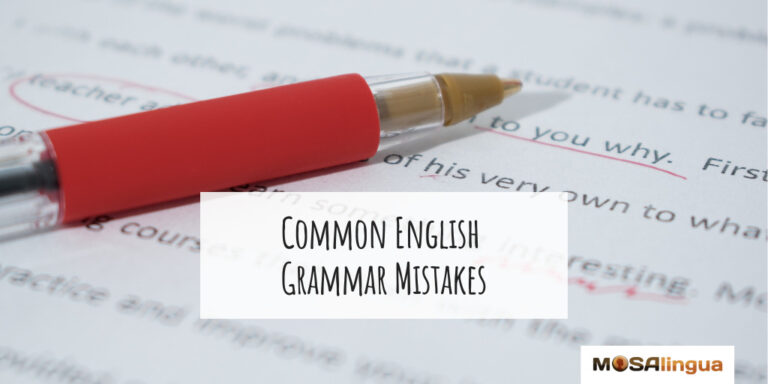Do you find that you’re often worried about making a mistake when you speak or write in English? Well, you’re certainly not alone. First off, English grammar is notoriously complicated. And second, just about every person who has ever learned a language has experienced some anxiety about tripping up and making a mistake. Even though this is a relatable and valid fear, I’m here to tell you today that even native speakers make mistakes on a pretty regular basis. In fact, these errors are so common, I put together a list of some of the most common English grammar mistakes you might hear from native speakers.

What’s inside…
Even Native English Speakers Make Mistakes!
The fact that even a native speaker can make grammar “mistakes” does not mean that they’re uneducated or that they don’t speak English well. Even though we know the correct grammar rules and words to use, native speakers often bend these rules and modify our speech based on how formal we want to sound, regional differences, or whether we want to speak faster, for example.
Often, English learners (like you) might notice an unconscious grammatical error right away. Those who are learning a language tend to pay closer attention to the language’s official rules.
By the end of this article, I hope you will understand that making mistakes is normal—even for native speakers. You might also change your opinion about mistakes when it comes to language learning!
The Most Common English Grammar Mistakes
Error #1
Let’s look at a few sentences together—see if you can find the error.
– How many people are coming to the party?
– I think there’s around 30 people coming!
Did you notice the mistake here? In this sentence, the second person uses the contraction “there’s.” But “there’s” means “there is.” Because we’re talking about 30 people, we cannot use the
singular form of the verb. Instead, we need to use the plural form. So it needs to be “there are.”
– How many people are coming to the party?
– I think there are around 30 people coming!
This is a very common tendency that often goes unnoticed by native speakers. You might also notice this mistake being made with other contractions. For example:
– Here’s all of the clothes I bought.
The correct form should be:
– Here are all of the clothes that I’ve bought.
Mistakes like these are often made because we want to try and find faster ways of saying something. Saying “here’s” or “there’s” (although grammatically incorrect) when we need the plural form is much faster than saying “here are” or “there are.”
Maybe we need to invent a contraction like “here’re…” 🤔
Error #2
– What did you do last night?
– Me and Sarah went to the cinema to watch a horror film.
Did you notice the mistake?
The second person says “me and Sarah,” but they should have said, “Sarah and I.”
Let’s talk about this grammar rule a bit more. “I” is always used as a subject, but “me” is always used as an object. So, “I” is used to talk about the person who performs the action:
- I went to the cinema.
- I saw a film.
We couldn’t say, “me went to the cinema” or “me saw a film.” “Me” can be used as either a direct or indirect object:
- She came to the cinema with me.
- She watched a film with me.
A good way of remembering when to use “I” and when to use “me” is by asking yourself, would the sentence make sense if I took out the other person?
For example, let’s take the original sentence, “Me and Sarah went to the cinema to watch a horror film.” If we remove “and Sarah,” the sentence becomes “me went to the cinema to watch a horror film.” The sentence no longer sounds correct. If we say “I went to the cinema to watch a horror film,” it sounds correct.
So we know that we need to say, “Sarah and I went to the cinema to watch a horror film.”
Error #3
– I’m sorry to hear you lost your job. How are you feeling?
– Thank you. I don’t feel great. It’s really had a negative affect on my mental health.
Okay, firstly, maybe don’t correct someone’s grammar if they’re telling you how they feel. That can wait… But for the purpose of this lesson, can you find the mistake?
The person should have said, “it’s really had a negative EFFECT on my mental health.” Native speakers often confuse affect and effect. However, “affect“ is the verb, and “effect“ is the noun. Something affects something and might cause an effect.
Confusing? I know…
Unfortunately, these aren’t the only confusing words. We have a lot of homophones and homonyms in English. These are words that sound the same (or are even spelled the same) but have different meanings. Other examples include:
- there / their / they’re
- your / you’re
- lose / loose
(Remember: “there” is a location, “their” is belonging to, and “they’re” is “they are.” “Your” means belonging to, and “you’re” means “you are.” The last example has a slightly different spelling and
slightly different pronunciation. But they still get confused and they have different meanings. Lose is a verb meaning the opposite of “to win,” whereas loose is an adjective meaning the opposite of “tight.” For example, “My trousers are a bit loose. I need a belt.”)
Error #4
– Wow, I had 8 hours of sleep last night. I feel great!
– Yeah, I slept good too!
Here, the issue is confusion between adjective and adverb. Many English learners get “good” and “well” confused, but native speakers make this mistake too!
“Good“ is an adjective, whereas “well“ is an adverb. This means that “good” should modify a noun, whereas “well” modifies a verb. Since “sleep” is a verb, we should say, “I slept well” rather than “I slept good.”
Also, we should say, “He can sing well” rather than, “He can sing good.” (And “I speak English well,” instead of “I speak English good,” since “speak” is a verb!)
So, that means that our example should be:
– Wow, I had 8 hours of sleep last night. I feel great!
– Yeah, I slept well too!
Error #5
– How’s the new diet going?
– Not bad. I’ve definitely been eating less cookies!
Can you spot this mistake?
The second person should have said, “I’ve definitely been eating fewer cookies.” This is another common mistake among both English learners and native speakers: “fewer” vs. “less.”
The trick to getting this right is knowing whether the noun is countable, like cookies, or uncountable, like milk! We use “fewer” with countable nouns and “less” with uncountable nouns.
So:
Now that I’m eating fewer cookies, I’m also drinking less milk.
Error #6
– Did you ask that guy at the party for his number?
– No, but I should of!
Did you notice the mistake here? This one is definitely the most common when speaking. Native speakers often say “should of” or even “would of” or “could of.” This is because the correct form of these is
“should have,” “would have,” and “could have,” but the contractions are “should’ve,” “would’ve,” “could’ve.”
Over time, this has led to people saying it like “of” because, let’s be honest, it does sound kind of like that. But of course, it doesn’t make sense grammatically because “have“ is a verb and “of“ is a preposition. We can’t just switch them.
Have you noticed native speakers making these mistakes? Can you think of any other common mistakes that we haven’t mentioned?
In any case, I hope this list of common mistakes made by native speakers will make you feel less pressure to always have perfect grammar!
VIDEO: English Grammar Mistakes That (Even!) Native Speakers Make
If you like, you can review this same list in video format. Our teacher Lizzie Jane explains common grammatical errors that native English speakers like herself make in depth. Even more importantly, she offers explanations for why these mistakes are made, or which rules are being bent.
The video is also available on YouTube. The video is in English, of course, but subtitles are available in English, French, German, Spanish, Italian, and Portuguese! You can also adjust the playback speed. Watching videos in your target language is a great exercise to help you practice listening comprehension.
If you enjoyed our video on common English grammar mistakes, be sure to subscribe to our YouTube channel and turn on notifications. This way you won’t miss any of our content in English (and other languages)!
Next Steps
If you’d like to keep exploring English grammar, we recommend:
- Possessive and Demonstrative Pronouns [VIDEO]
- How to Use Grammar Check Tools to Improve Your English [VIDEO]
- 15 Facts About English That You May Not Know [VIDEO]


![The Present in English | English Grammar Hacks [VIDEO]](https://www.mosalingua.com/en/files/2018/01/1-300x169.png)

Comments